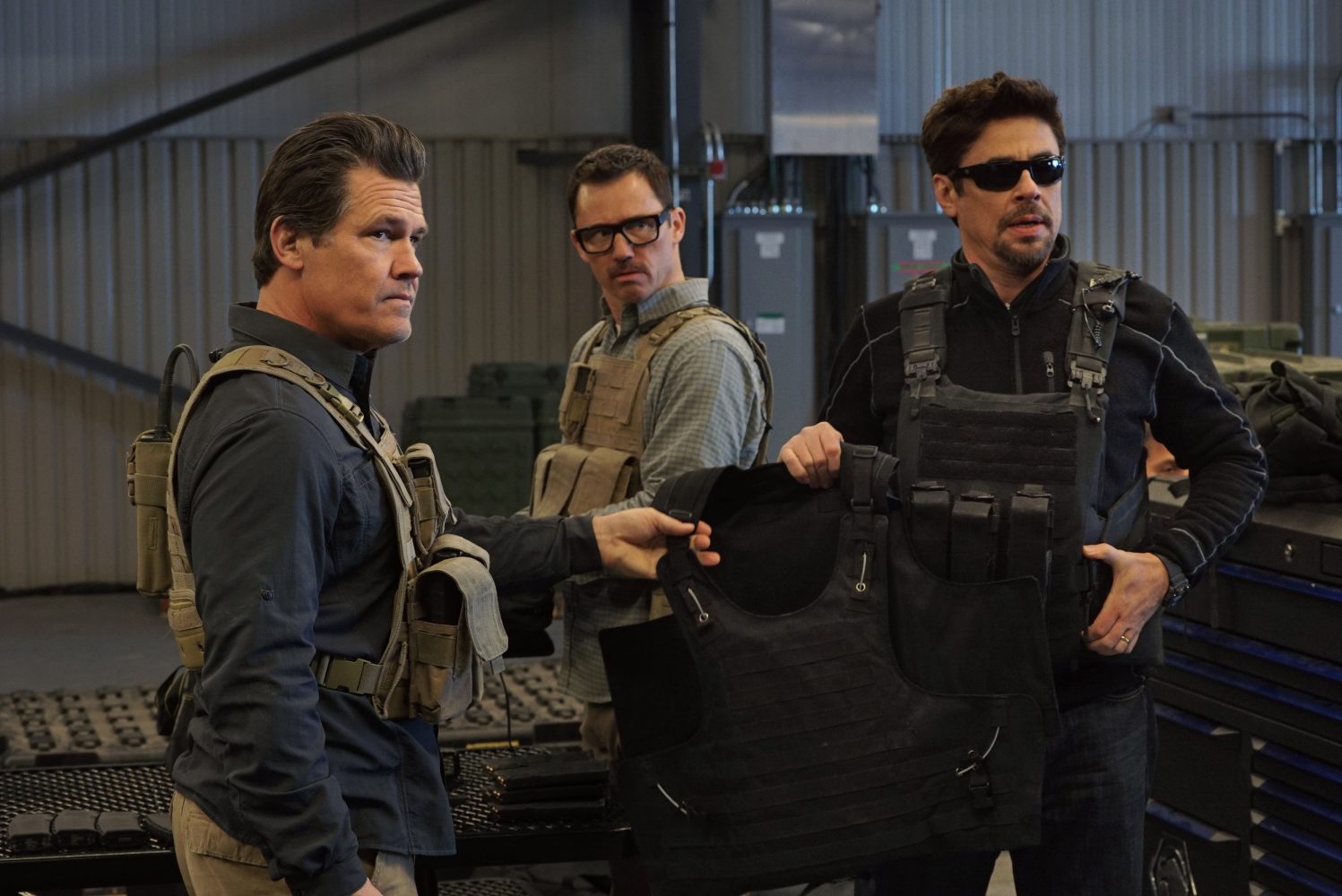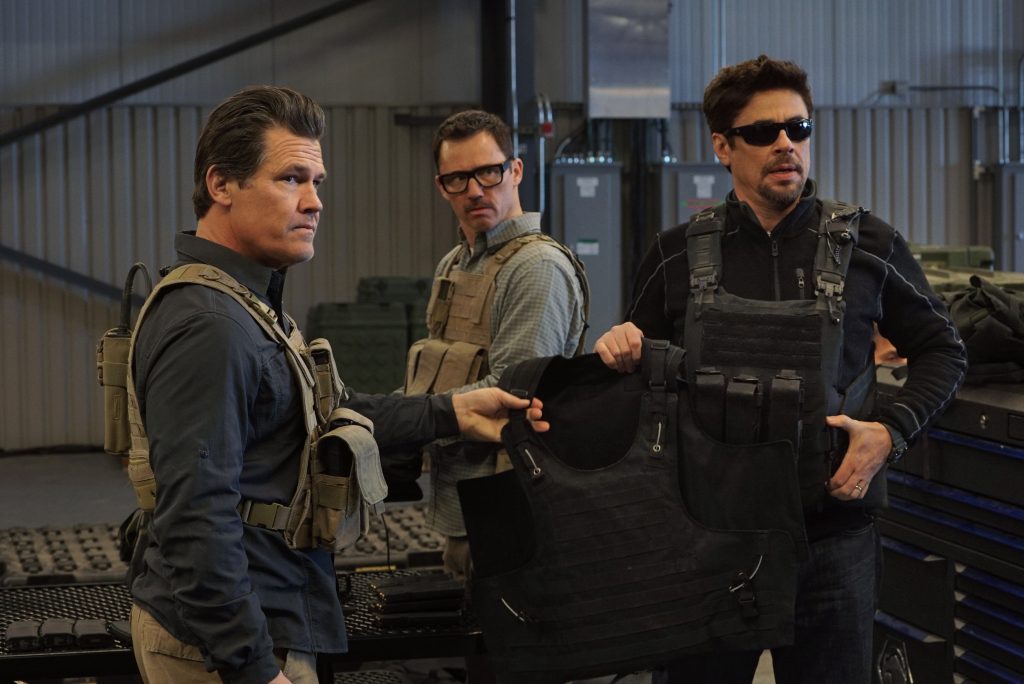Three years after Denis Villeneuve’s border-set thriller Sicario hit theaters, the sequel Sicario: Day of the Soldado is slated for release. Both films, written by Taylor Sheridan, star Josh Brolin and Benicio del Toro.
A quick scan of the reviews published by major outlets reveals a myriad of opinions. Variety‘s Peter Debruge described it as, “Tense, tough, and shockingly ruthless at times” while A.O. Scott wrote in the New York Times that it, “embraces a comforting form of cinematic conservatism, based on the mythical competence and essential decency of men whose vocation is violence.” For Vulture, Emily Yoshida gave it a mixed review titled “Sicario 2: Day of the Soldado Is a Transgressively Bleak Franchise Attempt.” While Yoshida admits that “Soldado opens with the uncomfortably timely image of Mexican migrants crossing the Texas border and being surrounded by border patrol officers,” what is missing from all of the criticism published so far is a comprehensive analysis of its Latino representation – in a film that is mostly set south of the US-Mexico border.
In order to diversify the voices that have been privileged with the opportunity to review this movie, we asked several Latino critics to put their opinions to paper. Find their capsule reviews below.
– Vanessa Erazo, Remezcla Film Editor
"Taylor Sheridan has a taste for writing stories where people of color are a central component, yet their perspectives are ignored."
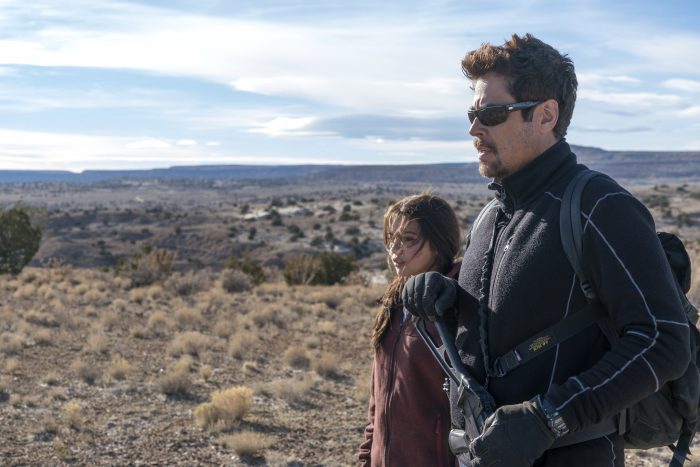
There is a scene near the end of Sicario: Day of the Soldado where Isabel Reyes (played by Isabela Moner), the kidnapped daughter of a prominent narco, and Alejandro (Benicio del Toro), the US-hired suave killer, come across an impoverished deaf man, Angel (played by Bruno Bichir – renowned Mexican actor and brother to Demián Bichir), who lives with his wife in the middle of the desert. His two-scene intervention is the only instance where innocent, everyday Mexicans are portrayed with minimal humanity in this morally reprehensible sequel.
Exponentially, and unnecessarily, more gruesome than its predecessor, this new installment in the white-bro-fantasy franchise – ripped straight from Call of Duty and Alex Jones’ daily tirades – once again presents an unbalanced perspective in which Mexican bodies pile up under the justification of United States security by any means necessary. Matt Graver (Josh Brolin), the abhorrent embodiment of insensitive US machismo, is never truly observed as a corrupt force and is held up as heroic at times. Instead, the blame is put elsewhere by pitting Mexican-Americans against undocumented immigrants, by depicting nearly all Latin American, African, and Middle Eastern people as criminals, and by having Isabela Moner (who in spite of the context and limitations delivers a touching performance) play a powerless victim.
If you are someone who can actually sit in a theater and watch this film without thinking about its political implications and how it feeds into the Trump narrative (even with its mid-movie glimpses of truth) then this is clearly for you. For the rest of us who believe there should be a certain level of responsibility to what’s put on screen, the mere existence of a work so blatantly obtuse signals the terrifying possibility that those who already dismiss the lives of immigrants and Muslims will find new ammunition for their hatred here.
It’s not that cinema shouldn’t explore the complex relationship between Mexico and the United States in a provocative manner, the problem is that writer Taylor Sheridan has a taste for writing stories where people of color are a central component, yet their perspectives are ignored (see Wind River as another example). He makes it obvious that his gaze is that of a straight white American male who can write a good thriller, but gives little importance to non-white characters aside from making sure stereotypes are perpetuated.
"I remain convinced that Trump tweets fueled every narrative decision."
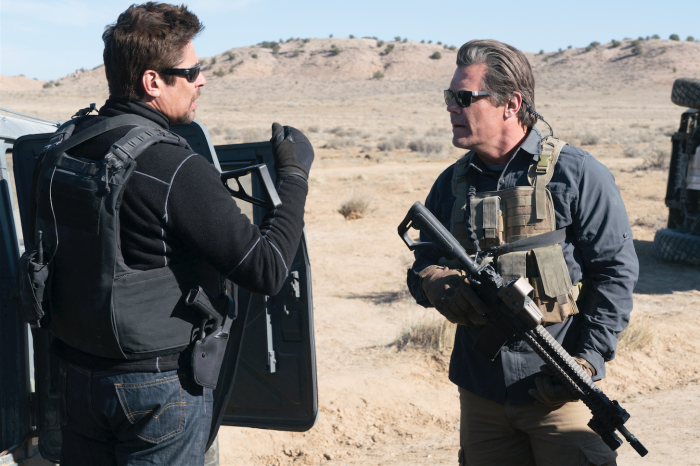
I hated the first Sicario so I knew I wouldn’t be pleased with this sequel, but I didn’t know I’d be outright offended. Sicario reveled in stereotypes, but Sicario: Day of the Soldado doubles down on everything. Screenwriter Taylor Sheridan didn’t read the room when he wrote this, or he did and wants to directly play up to the film’s audience of Trump supporters. The movie goes so far as to open with the reveal that Mexican drug cartels are helping Islamic extremists cross the border into the U.S. From there I remain convinced that Trump tweets fueled every narrative decision, right down to said extremists blowing up a store, as well as a clearly defined white woman and her white daughter. Nearly every Latino in this film is either an unnamed (or unseen) cartel member, is paid off by the cartels, wants to be in the cartel, or is generally associated with drugs. In fact, the movie’s central pawn is a cartel kingpin’s daughter who we watch get kidnapped, victimized, and illegally separated from her family in the hopes of sparking a drug war. Isabela Moner, who plays the cartel daughter Isabel Reyes, is the only standout in this trash fire of a feature. She’s lovely and is so expressive despite the script giving her nothing to do but be a victim. The flagrant “tease” for a sequel is just as bad, with 122 minutes spent decrying Mexico and its presumed land of cocaine only to end with the film’s “hero” attempting to further that for his own personal gain. Having just rewatched the first feature, Benicio del Toro’s Alejandro is also problematic. This is a man who had no compunction killing innocent children in the first movie, yet will sacrifice himself for a teenage girl in this one. (Taylor Sheridan is a little too fascinated with foreign teenage girls.) Del Toro is perfectly fine, but this movie doesn’t get a cookie for having one prominent Latino in the cast who supposedly isn’t terrible. In the times we’re currently living in, I don’t need to pay $20 to see Mexicans erroneously portrayed as horrid people. I can turn on the TV and watch our President do it.
"A testosterone-driven affair, a modern revisionist Western, where boys get to play with their toys, their target the “bad hombres” a certain leader of the so-called free world likes to tweet about."
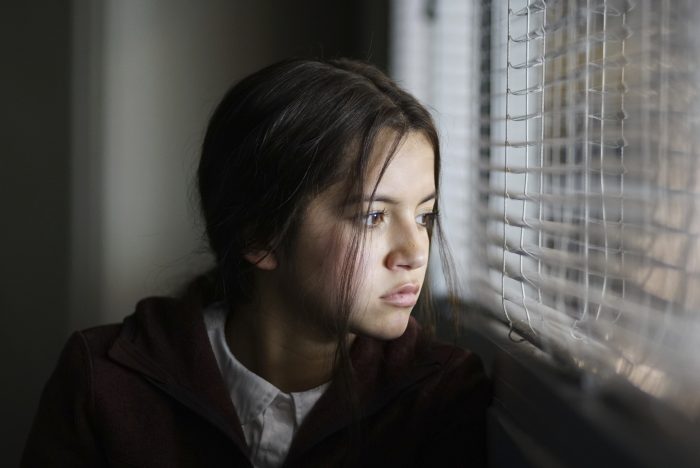
Timing is everything. Sony/Columbia may have chosen June 29 to release Sicario: Day of the Soldado, the morally compromised sequel to Denis Villeneuve’s Sicario, as a bit of counter-programming before Marvel Studios rolled out its next behemoth, Ant-Man and the Wasp, on July 6. But current affairs soon caught up to the film’s volatile mix of immigration, the drug war, and the United States’ interventionist politics with its opening coming on the heels of one of the most violent presidential elections in Mexico’s history and the current immigration crisis surrounding the separation of undocumented children from their parents as part of this administration’s reprehensible zero tolerance policy. The movie now has to be viewed under a different set of optics than those originally intended by writer Taylor Sheridan (scribe of the original Sicario and Hell and High Water) and Italian director Stefano Sollima (making his U.S. directorial debut).
Sheridan presents us with an alt-right conspiratorial nut’s wet dream: a man runs away from a group of immigrants rounded up by border patrol officers in McAllen, Texas and screams “Allahu Akbar” before blowing himself up; days later, four Middle Eastern men walk into a Kansas City supermarket and do the same. Convinced that the Mexican drug cartels are smuggling terrorists into the country, the Department of Defense tasks operative Matt Graver (Josh Brolin) with playing dirty; he recommends pitting the cartels against each other by kidnapping Isabel (played by Peruvian-American actress Isabela Moner), the teen daughter of a cartel kingpin. Graver brings his go-to guy, lawyer-turned-sicario Alejandro (Benicio del Toro) on board and the mission goes off without a glitch. Isabel’s eventual return to Mexico, however, not so much.
While in Sicario we had Kate, the FBI agent played by Emily Blunt, as our moral center, Sicario: Day of the Soldado is a testosterone-driven affair, a modern revisionist Western, where boys get to play with their toys, their target the “bad hombres” a certain leader of the so-called free world likes to tweet about. Immigration is a mere plot device; at least in the first film, those immigrants had faces, names, their plight felt more real. By the time the sequel addresses what’s right and what’s wrong, it’s too little too late. In the end, there is only one real victim: Isabel, whose shell-shocked gaze in the movie’s final minutes haunts us, briefly humanizing a cold, nihilistic universe.
"Benicio del Toro may have a few moving moments of humanity, but mostly everyone Latino is denied that complexity."
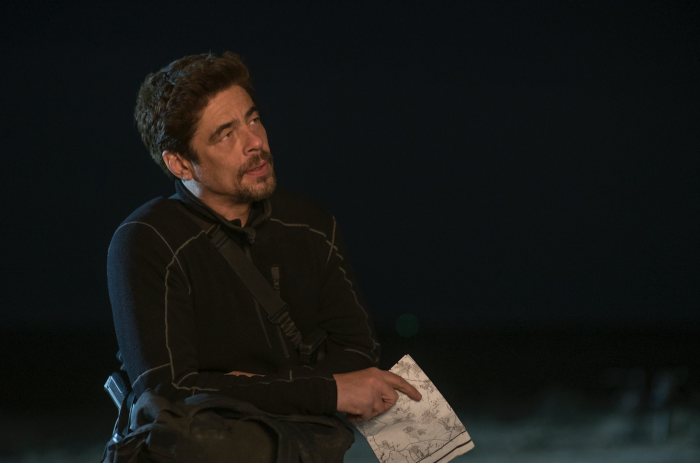
Sicario: Day of the Soldado is better remembered for all of the things it lacks from its predecessor, like a coherent plot and any semblance of nuance or morals. The original director Denis Villeneuve and cinematographer Roger Deakins are sorely missed, as are the major characters played by Emily Blunt and Daniel Kaluuya.
What’s left is a skeletal sequel built around supporting characters, Matt (Josh Brolin) and Alejandro (Benicio del Toro), and the illegal lengths they will go to destabilize Mexican cartels. Instead of taking the Sicario story in a new direction, the narrative doubles down on the worst aspects of the original, feeding into xenophobic stereotypes about people crossing the border.
In this new venture, Matt and Alejandro are tasked with getting the cartels to fight one another after its discovered a cartel smuggled Muslim suicide bombers across the border. The U.S. covert operatives kidnap that cartel leader’s daughter (Isabela Moner) to kickstart an underground war. But their plans go awry when giving back the teenager to the cartel, United States operatives kill several Mexican law enforcement officers to escape their gunfire. The outrage over the incident is apparently so volatile, even Fox News is against the the U.S.’s actions.
Little about the film’s premise or execution felt promising, and as the movie took one absurd turn after another, the thrill was gone leaving only disbelief. Stefano Sollima, Soldado’s director, specializes in crime dramas with titles like All Cops Are Bastards and revels in this movie’s chaos and terribly high body count. There’s no lead character like Blunt’s in the original to call attention to their extralegal operations or to become outraged at Matt and Alejandro’s methods. Del Toro may have a few moving moments of humanity, but mostly everyone Latino is denied that complexity.
Although Taylor Sheridan wrote the first Sicario, he ditches any attempts to understand the Mexican families caught in between the cartels and United States’ skirmishes. Instead, he cashes in on President Trump’s fear mongering rhetoric around immigration, painting almost every brown person on screen as implicit co-conspirators to the gun-toting bad guys, including the Americans. Although it was filmed months before the public outcry over the separation of children from their parents at the border, there’s a hint of irony in the movie’s plot where a U.S. military group kidnaps a Mexican teenager. It’s as if we were always capable of these monstrosities, both on-screen and off.
"The film cares not a whit about the suffering of anyone with brown skin, whether they are tortured Somalis, Latinx migrants, or a privileged daughter of a Mexico City drug lord."
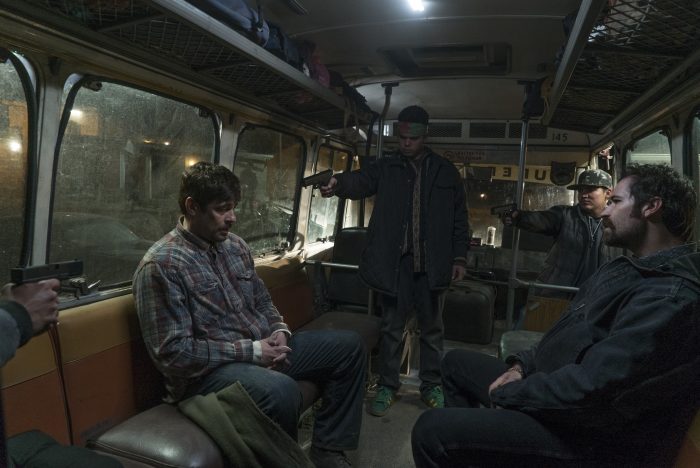
Intentionally savage and casually racist, Sicario: Day of the Soldado is exactly the movie we’d expect – and dread – from Hollywood during the Trump administration. It feeds right into a large swath of the country’s xenophobic fears. Those who listen to the president’s racist rants or heed his taunting tweets will be further persuaded by this sadistic action thriller that the U.S. border is plagued by bad hombres on both sides.
Where its predecessor, 2015’s Sicario was intermittently thoughtful, this sequel is mindlessly mean-spirited. Denis Villeneuve’s original featured an underlying morality in the character of the idealistic FBI agent played by Emily Blunt. Italian director Stefano Sollima’s follow-up lacks Blunt, and has bluntly jettisoned any moral underpinnings.
Human strife is merely a backdrop here. In addition to a contrived plot, Day of the Soldado regards the fate of immigrants as incidental, as it glorifies the every move of callous government-sanctioned hit-men, like Graver (Josh Brolin) and Alejandro (Benicio del Toro), who return from the first film. While Brolin and Del Toro play their roles capably, Graver and Alejandro so wholeheartedly embrace barbarism that they make it impossible to accept them as action heroes. The film is never even remotely critical of the pair’s ruthlessness.
This time around, Mexican drug cartels have taken up human trafficking and transporting terrorists. Apparently, there’s more money to be made in these pursuits than in selling cocaine. As debatable as this may be, what seems clear is that the film cares not a whit about the suffering of anyone with brown skin, whether they are tortured Somalis, Latinx migrants, or a privileged daughter of a Mexico City drug lord – played by Isabela Moner – who gives the film’s most memorable performance as a kidnap victim. Collateral damage is as ubiquitous as dusty scrub plants in this brutal culture clash.
The latest Sicario, as ham-fistedly written by Taylor Sheridan, has a kind of vacant timeliness, lacking any nuance in its depiction of incendiary issues. Of course, the filmmakers couldn’t have known that this border thriller would be released in the midst of one of the worst immigration crises in the nation’s history. But context is sorely lacking. Why does a quiet middle school kid get mixed up in shepherding refugees for cash? Virtually all the Latino characters in the film are portrayed as clichéd villains – drug dealers, dirty cops, or greedy kids taking advantage of hapless immigrants.
Perhaps if we saw more films with Latinx characters, one movie reeking of amoral machismo – even one that seems to revel in its viciousness – wouldn’t be so disturbing. But when Latinx actors play only 2.7% of roles in top films, a major Hollywood release like Sicario: Day of the Soldado serves only to amplify stereotypes, encourage fear-mongering and intensify racial tension.



